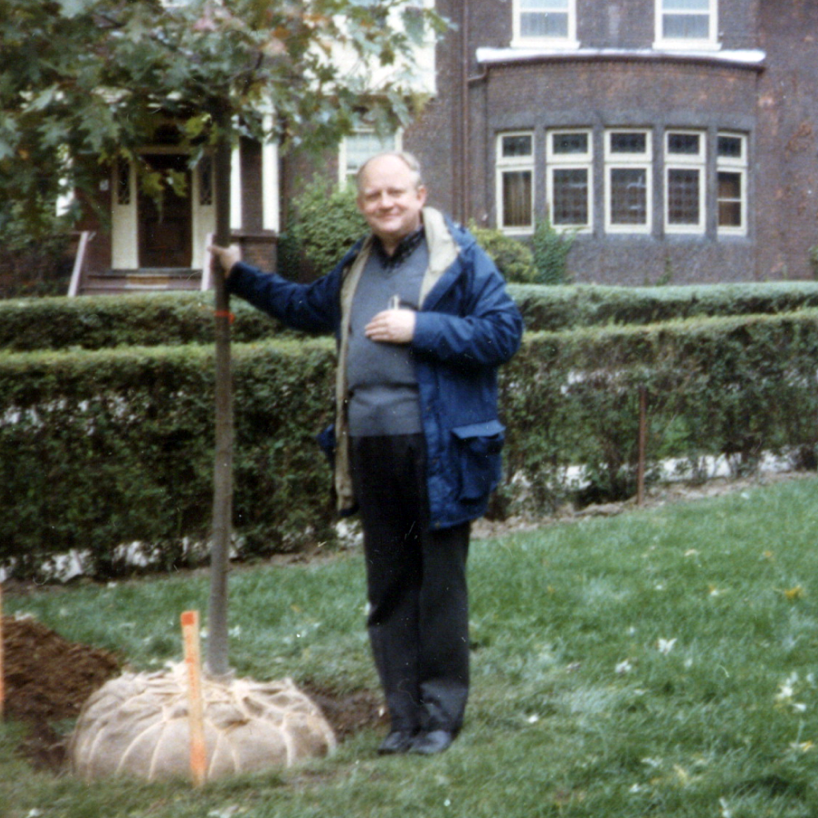Father Donald Francis Finlay, CSB, was a familiar face on the University of St. Michael’s College campus from his time as a student in the early 1960s through his years as Chief Librarian of the John M. Kelly Library in the 1980s and 1990s, where he would often be found as a welcoming presence in the library lobby.
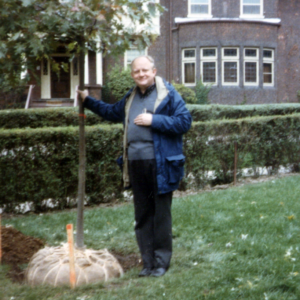
Father Finlay died earlier this month at Presentation Manor, the retirement home for Basilian priests. He was 88.
Father Finlay worked first as a teacher in Toronto’s Catholic school system before entering the Basilian novitiate in 1957. He enrolled in St. Michael’s Faculty of Theology in 1962, receiving his S.T.B. degree in 1965, and was ordained in December of that year.
After earning a Master of Arts degree in Library Science, he was appointed Librarian at the Pontifical Institute of Mediaeval Studies (PIMS) in 1967, while also being named the local Superior of the Institute Basilians and later of the wider community of St. Michael’s. Appointed Acting Chief Librarian of the Kelly Library in 1985, he was named Chief Librarian later that year. Father James Farge, CSB, who followed Fr. Finlay as a Chief Librarian at PIMS, recalls the dedication he had toward student education, meeting with students to help them determine how best the Kelly could meet their needs. The dedication created fans in all sorts of places. Once, recalls Father Farge, Father Finlay was at the airport and was asked by the ticket agent behind the counter: “But who is saying the 12:10?,” a reference to the noon Mass at St. Basil’s Church.
Father Finlay also served as a don and was widely respected by the students under his care, many of whom stayed in touch for years after graduating. Rod McEwan (SMC 9T5) recalls arriving at what was then Belisle House (now Founders House) and seeing Father Finlay sitting in a rocking chair on the porch, reading the paper. McEwan recalls feeling a bit intimidated but that impression soon changed.
A month after arriving at St. Mike’s, as a student from a small town he made the mistake of answering the front door late at night to a grifter, who convinced him he had lost him money and needed to get home to somewhere out of town – money he promised would replace.
“I gave him my last $50, not realizing it was a scam,” McEwan recalls. A few days later, an unmarked enveloped appeared under Rod’s door. For a long time he thought the man had returned the cash until it dawned on him: Fr. Finlay had replaced the money himself.
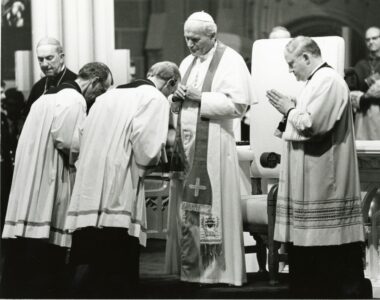
In 1992, when Father Finlay was assigned new duties within the Basilian community, Father Michael Fahey, SJ, then Dean of the Faculty of Theology, presented a citation to the university’s Collegium, where Father Finlay had served, that included thanks for his “yeoman’s service” as Master of Ceremonies at liturgical functions. That service extended to work on the Liturgy Subcommittee before then-Pope John II visited Toronto in 1984.
Father Fahey’s citation also noted that Fr. Finlay’s “broad cultural instincts” were “invaluable for judiciously discerning how our various library collections should be strengthened…. thanks to his leadership our Library remains a magnificent instrument to assist research and student alike.”
That sentiment is seconded by James Roussain, who is the William D. Sharpe Chief Librarian and Director of Special Collections at the Kelly Library.
“Fr. Finlay’s work in building the collections that are now core to the Kelly Library cannot be overlooked: we owe much to his dedication to St. Mike’s and to its students.”
In 2017, PIMS named the Donald F. Finlay Reference Room in the Kelly Library in his honour.
Fr. Finlay was also dedicated to broader community engagement. As his collegium citation noted, “Father Finlay was a faithful and long-suffering member of the University of St Michael’s College working committee that dealt with the Bay Street development proposal. He sat side by side with Jack Layton and Liz Amer, as well as citizens on both sides of the issue, and was a paragon of level-headedness.”
The University of St. Michael’s College extends our condolences to the Basilians and to Father Finlay’s friends and family.
The University of St. Michael’s College offers its condolences to the Sorbara family on the loss of Joseph Sorbara (SMC 6T3), a man celebrated for his business acumen, philanthropy, community leadership, love of family and his tremendous support of St. Michael’s.
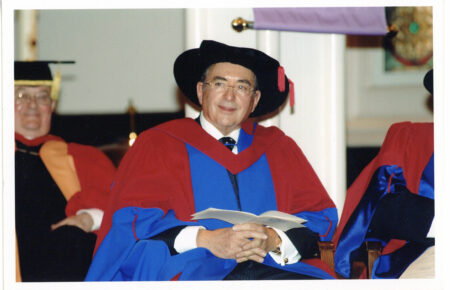
“Joseph Sorbara was an extraordinary friend to St. Michael’s,” says President David Sylvester. “His leadership strengthened our institution, and his memory will endure through the generosity and commitment he inspired.”
A prominent figure in the Canadian business community, Mr. Sorbara was owner and Principal of Sorbara Group, a family-run business founded by his father, Sam, more than 80 years ago. Specializing in real estate, development, and property management, the Sorbara Group continues to shape communities across southern Ontario.
That impact is deeply felt at St. Michael’s, where the family’s generosity is commemorated in both the Sam Sorbara Auditorium in Brennan Hall and Sorbara Hall, the elegant student residence dedicated to the memory of Sam and Grace Sorbara, which opened in 2001.
The family has maintained a deep connection to St. Michael’s, recognizing the university as a vital centre for the Catholic intellectual tradition. Joseph’s father studied at St. Michael’s, as did Joseph’s siblings and other family members across generations.
Beyond his business success, Mr. Sorbara was a dedicated community leader, serving on numerous boards and foundations. He was a director of the St. Michael’s College Foundation, a member of York University’s Board of Governors, and chaired the Mediaeval Studies Foundation at the Pontifical Institute of Mediaeval Studies. A founding member of Villa Columbo Home for the Aged, he also served as Chair of the Advisory Board of OMNI Television and as a director for various private corporations.
He was honoured with a vast array of awards, including the Knight of Grace of the Sovereign Order of St. John of Jerusalem – Knights of Malta (2000), Cavaliere dell’Accademia di Calabria (2001) and Commendatore dell’Ordine della Stella della solidarieta italiana (2009).
In 2001, he received the Arbor Award from the University of Toronto, recognizing his outstanding volunteer service.
Mr. Sorbara’s generosity toward St. Michael’s went far beyond financial contributions—he was an advocate, a leader, and an inspiration to others. He founded the St. Michael’s Chancellor’s Club to recognize the loyalty and generosity of alumni and donors, and the University of St. Michael’s College Millenium Golf Classic which has since raised more than $3 million to support St. Michael’s. His ability to inspire philanthropy was evident in his leadership of The Campaign which set an ambitious $7 million goal—but raised an astonishing $42 million.
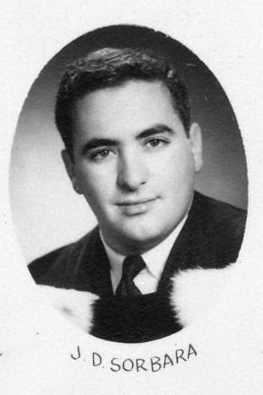
Mr. Sorbara’s time at St. Michael’s had a lasting influence. Studying English literature, he once dreamed of becoming a poet. During a 2010 convocation address at York University, he reflected on a conversation with his father:
“You can imagine that back in the early 1960s, this was not a career choice that impressed my late father. His primary concern was that as a poet I could not support a family. … A concern that was certainly understandable coming from a man who arrived in Canada from Italy as a boy with no money, a less than basic elementary education, a largely absentee father and a mother who died when he was a teenager, leaving him to look after his brother and two sisters.”
He also spoke about his commitment to giving back: “I guess I’ve been given a lot. I can’t eat any more than what I eat. I can’t drink any more than I drink, and I’ve never been impressed with having a lot of money in the bank. I took from York. I took from St. Michael’s. I took from everybody. Why shouldn’t I give somebody else the same opportunities I had?”
Dr. Richard Alway, who knew Mr. Sorbara from their days at St. Michael’s and worked closely with him as university president, recalled his deep ties to the institution. “St. Michael’s was a place of very positive memories for Joe. He had strong associations here, both from his own time as a student and because his father had also studied at St. Mike’s,” says Dr. Alway. “He was always ready to leverage his business connections to support university fundraising.”
After earning his BA at St. Michael’s, Mr. Sorbara went on to earn an MA in English from the University of Toronto in 1966 and an LLB from Osgoode Hall Law School in 1968. In recognition of his contributions to St. Michael’s and beyond, he was awarded an honorary Doctor of Sacred Letters, honoris causa, by St. Michael’s in 2006.
The University of St. Michael’s College extends its deepest condolences to Mr. Sorbara’s wife, Antoinette, his children Paul, Julia, and Thomas, his siblings Edward, Gregory, and Marcella Tanzola, and the extended Sorbara family. He was predeceased by his son, Samuel (1972). Joseph’s leadership, generosity, and devotion to St. Michael’s will be remembered for generations to come.
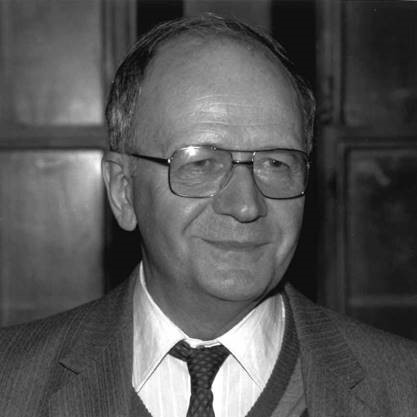
The Pontifical Institute of Mediaeval Studies (PIMS) is mourning the death of long-time faculty member Fr. Édouard Jeauneau, who died at the age of 95 on Monday, Dec. 9, 2019 in Chartres, France.
Fr. Jeauneau was a Professor of Medieval Philosophy at PIMS and the Centre for Mediaeval Studies (CMS) at the University of Toronto from the 1975 through to 1995. He was named Institute Professor at PIMS in 1990 and was awarded an honorary doctorate in 2002.
His involvement in the medieval community in Toronto began following a formal invitation in 1974 to join the PIMS Faculty from Rev. E.A. Synan, Praeses, and Rev. James McConica, CSB, Chairman of the Search Committee.
Until 2015, he spent about eight months each year working on his many projects here in Toronto, most notably the five-volume Periphyseon of Johannes Scottus Eriugena (Turnhout: Brepols).
Fr. Jeauneau was consistently awarded substantial Social Sciences and Humanities Research (SSHRC) grants, and hired a long string of Centre students to work for him, paying them generously. He also trained many of these students in reading the particular handwriting in the manuscripts and in editing the texts.
Among the honours bestowed on him over the years was the position of Directeur de Recherche Honoraire au CNRS in Paris, France’s National Centre for Scientific Research, and an appointment as a fellow of the British Academy.
A funeral Mass will be held Monday, December 16 in his small home town of Coudray-en Perche, about 60 km from Chartres.
His presence will be missed by all who knew him.

